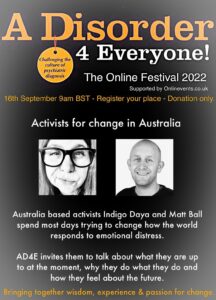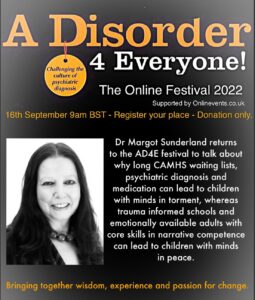The MITUK team are enjoying a day of activism, inspiration, panels and talks about challenging the medical models of distress with the A Disorder For Everyone online festival – a day dedicated to friend and colleague Pete Sanders.
Editor’s Note: videos of the talks and panels will be uploaded when they are available and also shared on the AD4E channel.
AD4E Festival 2022 – A gathering of a global community, with nearly 800 attendees throughout Europe, America, South Africa, Australia and beyond – all interested in challenging the pathologizing of emotional distress, holding each other in a place of safety, connection and shared experience.
As Jo Watson AD4E founder began in her festival opener, AD4E are people “largely here because they are disatisifed by medicalised, dehumanising culture of diagnosis… here to challenge the mainstream narrative”. Jo summed up her beliefs as “motivated by a belief that emotional distress is caused by experience, largely rooted in social factors”.
A Diagnosis for Everyone /a dɪsˈɔːdə fawr ˈɛvrɪwʌn/: a somewhat tongue-in-cheek nod towards the pathologizing medicalised diagnostic models of human experience and emotion, which means anyone who cares to look, could find a disorder that applies to them
The day started with this moving poem by Sanah Ahsan, Decolonising Distress:
We heard from AD4E founder Dr Lucy Johnstone in her talk on the problems of psychiatric diagnoses and questioning whether diagnostic narratives are the most helpful, relevant or scientifically grounded ways to help people in distress.
Psychiatric diagnosis is “subjective opinion masquerading as scientific fact” – Dr Sami Timimi
Lucy presented some damning quotes: “Bullshit” – Dr Allen Frances, Chair of the DSM-IV Committee, the “DSM 5 will radically and recklessly expand the boundaries of psychiatry… there is no reason to believe that DSM 5 is safe or scientifically sound”
“DSM is totally wrong, an absolute scientific nightmare” – Dr Steven Hyman, former NIMH Director
How do we decide who is mentally ill when there is no cut off between ‘well’ and ‘ill’? Criteria are essentially subjective because there are no medical tests for “mental health problems” and in fact no evidence for biochemical imbalances, faulty genes or any other biological causes of mental distress.
“Patients… deserve better… the weakness is its lack of validity” – Dr Thomas Insel, former NIMH Director
Lucy’s talk called for better ways of acknowledging and accepting human struggles, similarities and differences, taking a wider lens to understand why this is so hard, how we got here, and what we might need to do instead. This means considering:
- Existing alternatives
- Underlying assumptions and contexts
- New frameworks
Lucy introduced the Power Threat Meaning Framework, explaining the PTMF is not interested in modifications of the existing diagnostic models, but proposes a completely new approach.

Indigo Daya & Matt Ball activists from Australia let us listen in to their conversation about their activism – “speaking from our hearts and our experiences”.
“Who does it serve to be quiet about our distress?” – Indigo Daya
Matt and Indigo called for activism, not just advocacy… “Be where the change is”… “Systems like us to be in systemic advocacy roles… while the great structure rolls on in the background”, speaking powerfully that “reform of broken, unmendable systems is not our aim… systems cannot be reformed. The system does not want to be reformed… it is a cauldron of violence dressed up like a gingerbread house.
“You have a choice to be an activist in whatever role you find yourself in”, small every day moments or big changes and huge events
Matt summed up the festival and his work as “Finding spaces of connection” and “returning space of human distress back to the community”. Indigo and Matt described the systems as upholding patriarchy, misogyny, racism, ableism, transphobia and hate, while activism is rooted in love and compassion.
Further Links:
Suicide Narratives – as Matt introduced: “use it with your friends, at work, on the bus… that is true emancipation”
Dissociachotic theory – an explanatory framework for the emergence and evaporation of altered states of experience
Indigo’s art installation, Slice/Silence
Manifesto for Compassion Change
The Just Listening Report – a community-led alternative to emergency mental health supports or visiting the hospital emergency department for people in distress or crisis
Russian dolls and epistemic crypts: A lived experience reflection on epistemic injustice and psychiatric confinement – Indigo’s paper on psychiatric confinement

Dr Margot Sunderland spoke on the need for belonging, connection, validation and hope in schools, CAMHS and child services. Margot’s talk included multiple videos from young service users, highlighting the individual voices, and how listening and understanding is experienced as therapeutic, validating and hope-giving to these people.
“No one had ever asked her what it felt like…”
Margot explained some of her work in affect-labelling, the value of putting words to feelings and the importance of feeling your feelings, not managing them. “You cannot get well from managing, that is symptom control”
“It’s like using a bucket to stop a tsunami”
Margot posed a challenge to mental health workers, unless they can answer the following two questions accurately there can be little hope of positive change:
Question One: What’s happening in mind, body and brain when a person is ongoing psychological pain?
Question Two: What evidence-based relational interventions are you using to alleviate psychological pain in ways that bring long-term transformational change (for mind, body, brain) rather than just symptom control?
Margot ended her talk with an optimistic call to action for teachers, parents and professionals working with children and young people, describing one trusted adult before the age of eighteen as a protective factor, sharing excerpts of this powerful TED talk:
“stop doubting that you are a hero… the hero is you” – Jazz Ampaw-Farr
